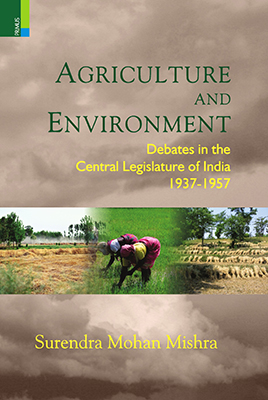
Agriculture and Environment: Debates in the Central Legislature of India, 1937–1957
EDITOR – Surendra Mohan Mishra
| HB ₹1395 . $59.95 . £39.95 |
||
INFORMATION
- EDITOR : Surendra Mohan Mishra
- HB ISBN : 978-93-84082-11-6
- Year : 2015
- Extent : 254 pp
- Discount available on checkout
- Usually dispatched within 3 to 5 working days.
Tagore
| HB ₹ 995 . $ . ₤ |
PB ₹ . $ . ₤ |
|
| POD ₹ . $ . ₤ |
e-Book ₹ . $ . ₤ |
INFORMATION
- AUTHOR –
- ISBN – 978-93-84082-78-9
- Year – 2016
- Extent: 400 + 40 coloured illustrations
- 10% discount + free shipping
- Usually dispatched within 3 to 5 working days.
This book studies agriculture-related debates in the Central legislature of India between 25 January 1937, the first day of the Fifth Session of the Fifth Legislative Assembly, and 28 March 1957, the last day of the First Lok Sabha. It details various aspects and shades of the agrarian culture of India that underwent transformations as a consequence of contact with an industrially advanced colonial culture. With 15 August 1947 forming the dividing line between the British Raj and the Republic of India, this book looks at various aspects and agencies of agriculture in India during the two historic decades before and after the nation’s freedom at midnight. As such, it is a significant tool towards understanding environmental history in India, for while engagement with the environment became commonplace post-1970, the basic awareness that agriculture affects the natural environment, and is in turn affected by it, has been part of traditional subcontinental wisdom.
The Editor
Surendra Mohan Mishra is a Former Deputy Director (Research), Indian Council of Historical Research, New Delhi
As a global figure, Tagore transcends the boundaries of language and reaches out to people distant both in time and space. His art took inspiration from contemporary Western trends and became a powerful means to connect with people beyond Bengal. Word, image, song, and text were his tools of communication, as also his extraordinary presence in a sartorial garb of his own design. A littérateur in many genres, the impact of his work was determined both by the material he presented, and by its simultaneously local and global contexts. Now, when his international reputation has spanned over more than a hundred years, it is important to revisit the sites of Tagore’s eminence, and ask to what extent he was a ‘living text’ in the century that witnessed him as a global intellectual.
Accordingly, this volume investigates how Tagore’s writings and art are linked to the metalinguistic domains of the psychological, medical and mythical; how he was received in various cultures outside India; how his art was determined by individual circumstances and global aspirations; and how he acted as an inspiration to his contemporaries and subsequent generations including modern Indian writers and artists.
The Editor
Imre Bangha studied in Budapest and Santiniketan and at present is Associate Professor of Hindi at the University of Oxford. He has published books and essays in English, Hindi, and Hungarian on literature in Brajbhasha and other forms of old Hindi and has also prepared Hungarian translations from various South Asian languages. His work on the international reception of Bengali culture includes Rabindranath Tagore: Hundred Years of Global Reception (2014, co-edited with M. Kämpchen) and Hungry Tiger: Encounter between India and Central Europe (2007).
Table of Contents
Table of Contents
| Preface | ix |
| Acknowledgements | xi |
| Introduction | 1-24 |
| 1. The British Colonial Politics of Power Over India and the Indian People | 25-69 |
| 2. Agriculture and Concept of Environment in Higher Education in India | 70-96 |
| 3. Modern Agricultural Research in India | 97-149 |
| 4. Environmental Consciousness and New Trajectories | 150-181 |
| 5. Politics of Power vs. Politics of Fundamental Rights Over Land and People | 182-201 |
| 6. Conclusion: Agriculture in India’s History, a Few Genralizations | 202-204 |
| Select Bibliography | 205-221 |
| Index | 223-241 |




